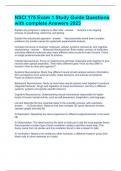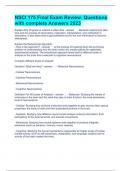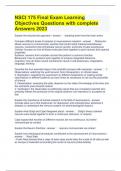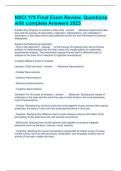Nsci 175 exam 3 answers - Study guides, Class notes & Summaries
Looking for the best study guides, study notes and summaries about Nsci 175 exam 3 answers? On this page you'll find 38 study documents about Nsci 175 exam 3 answers.
Page 4 out of 38 results
Sort by

-
NSCI 175 Exam 1 Study Guide Questions with complete Answers 2023
- Exam (elaborations) • 5 pages • 2023
-
Available in package deal
-
- $18.99
- + learn more
NSCI 175 Exam 1 Study Guide Questions with complete Answers 2023 Explain why progress in science is often slow Science is an ongoing process of questioning, observing, and testing Explain the reductionist approach Neuroscientists break down complex problems into smaller pieces for systematic experimental analysis Compare the levels of analysis: molecular, cellular, systems, behavioral, and cognitive neuroscience Molecular Neuroscience: Brain matter consists of molecules and the...

-
NSCI 175 Final Exam Review. Questions with complete Answers 2023
- Exam (elaborations) • 26 pages • 2023
-
Available in package deal
-
- $22.49
- + learn more
NSCI 175 Final Exam Review. Questions with complete Answers 2023 Explain Why Progress in science is often slow -Because experiments take time and the process of observation, replication, interpretation, and verification is exhaustive. It also takes time to get published and for the new information to become widespread. Explain the Reductionist Approach: - How is the Approach? Is the process of breaking down the enormous problem of understanding how the brain works into smaller pieces ...

-
NSCI 175 Exam 1 Questions with complete Answers 2023
- Exam (elaborations) • 9 pages • 2023
-
Available in package deal
-
- $19.99
- + learn more
NSCI 175 Exam 1 Questions with complete Answers 2023 Explain the Reductionist Approach Breaking down the study of the brain into multiple components (Molecular, cellular, systems, behavioral, and cognitive) Compare different levels of analysis in neuroscience research Molecular: The study of the brain at its most elementary level Cellular: Focuses on studying how all molecules work together to give neurons their special properties Systems: Constellations of neurons form complex circu...

-
NSCI 175 Exam 1 Questions with complete Answers 2023
- Exam (elaborations) • 16 pages • 2023
-
Available in package deal
-
- $20.49
- + learn more
NSCI 175 Exam 1 Questions with complete Answers 2023 Why are a broad perspective and an interdisciplinary approach required for understanding the brain? Choose the correct option. A. Understanding the brain requires the analysis of one approach at a time to yield a new synthesis. B. Understanding the brain requires knowledge about many things, from the structure of the water molecule to the electrical and chemical properties of the brain. C. Understanding the brain requires the study of the ...

-
NSCI 175 Exam 1 Questions with complete Answers 2023
- Exam (elaborations) • 10 pages • 2023
-
Available in package deal
-
- $20.99
- + learn more
NSCI 175 Exam 1 Questions with complete Answers 2023 Explain the reductionist approach Breaking the topic of neuroscience down into smaller pieces (Cognitive, Behavior, Systems, Cellular, Molecular). Pros: can be more detailed; get a better explanation of the topics Cons: can be hard to see the big picture Compare different levels of analysis in neuroscience research (molecular, cellular, systems, behavioral, and cognitive neuroscience) Molecular- looking at the molecules that bind t...

-
NSCI 175 Final Exam Learning Objectives Questions with complete Answers 2023
- Exam (elaborations) • 35 pages • 2023
-
Available in package deal
-
- $22.49
- + learn more
NSCI 175 Final Exam Learning Objectives Questions with complete Answers 2023 Explain the reductionist approach breaking down how the brain works Compare different levels of analysis in neuroscience research Molecular: allows neurons to communicate, sentries that control what material enters/leaves neurons, conductors that orchestrate neuron growth, archivists of past experiences Cellular: focuses on how all these molecules work together to give neurons their special properties S...

-
NSCI 175 Final Exam Review. Questions with complete Answers 2023
- Exam (elaborations) • 26 pages • 2023
-
Available in package deal
-
- $24.49
- + learn more
NSCI 175 Final Exam Review. Questions with complete Answers 2023 Explain Why Progress in science is often slow -Because experiments take time and the process of observation, replication, interpretation, and verification is exhaustive. It also takes time to get published and for the new information to become widespread. Explain the Reductionist Approach: - How is the Approach? Is the process of breaking down the enormous problem of understanding how the brain works into smaller pieces ...

-
NSCI 175 TEST COMPILATION BUNDLE 2023
- Package deal • 19 items • 2023
-
- $60.49
- + learn more
Exam (elaborations) UNC NSCI 175 Los Questions with complete Answers 2023 Exam (elaborations) NSCI 175 Exam 3 Quizzes Questions with complete Answers 2023 Exam (elaborations) NSCI 175 Exam 2 Questions with complete Answers 2023 Exam (elaborations) NSCI 175 Exam 3 Questions with complete Answers 2023 Exam (elaborations) NSCI 175 Exam 2 Ques

$6.50 for your textbook summary multiplied by 100 fellow students... Do the math: that's a lot of money! Don't be a thief of your own wallet and start uploading yours now. Discover all about earning on Stuvia


